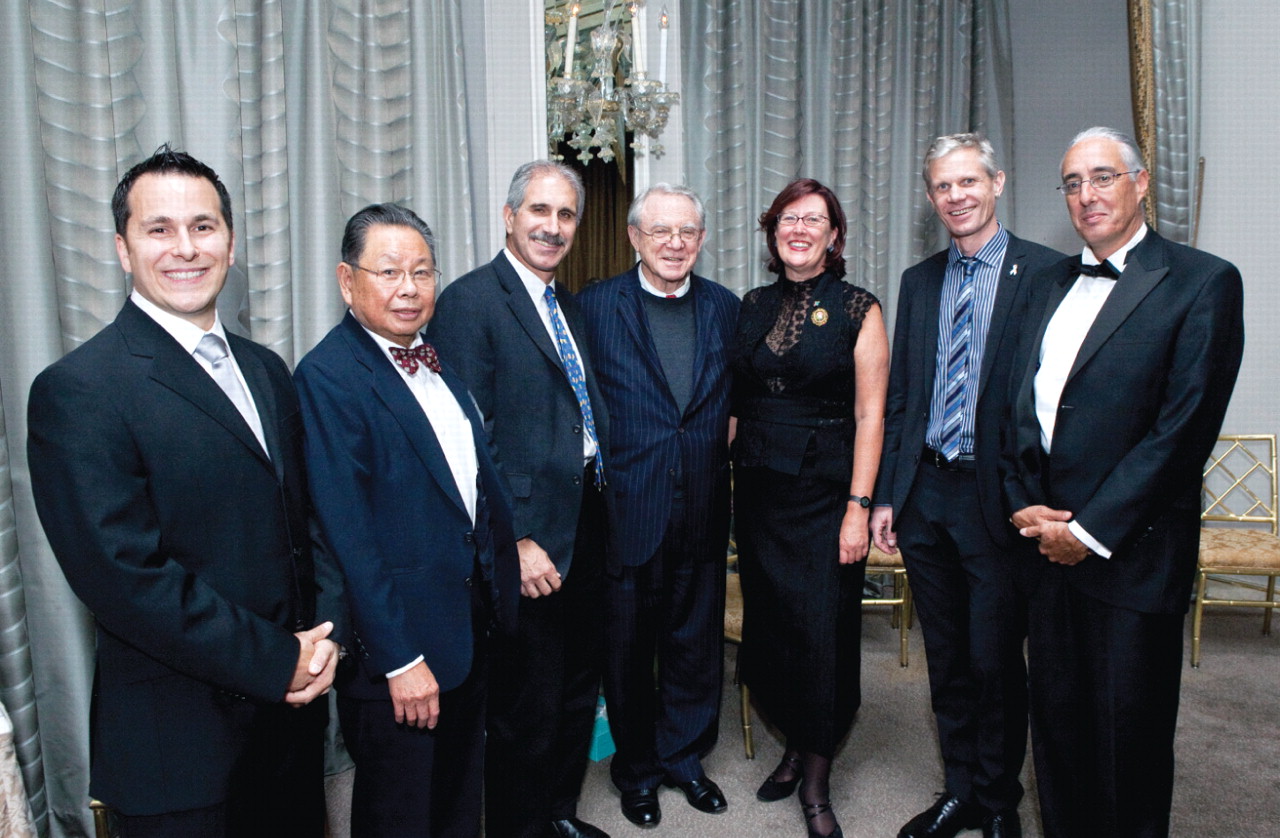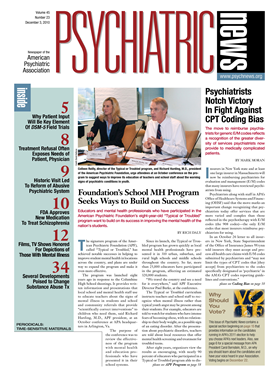Recognized as the leading donor-supported organization dedicated to finding the causes, improved treatments, and potential cures for mental illness, NARSAD: The Brain and Behavior Research Fund highlighted key discoveries in mental health at its 22nd annual Mental Health Research Symposium in New York City in October.
NARSAD was launched in 1981 by two neighbors in Kentucky who had children with mental illness and garnered support from four mental health associations: the American Mental Health Foundation, National Alliance on Mental Illness, Mental Health America, and the Depression and Bipolar Support Alliance. Former APA President Herbert Pardes, M.D., has been president of NARSAD's Scientific Council since its inception in 1986.
This year's Mental Health Research Symposium featured 11 leading mental health researchers who shared new insights and breakthrough research with conference participants. Six of the research panelists received NARSAD Outstanding Achievement Awards at the NARSAD National Awards Dinner, held the same day as the symposium. The remaining five researchers were NARSAD young investigators conducting research with the help of NARSAD grants.
The award recipients were recognized for their outstanding achievement in their research area. Here are this year's winners and the awards they received:
•.
Ming Tsuang, M.D., Ph.D., D.Sc., of the University of California, San Diego: Lieber Prize for Outstanding Achievement in Schizophrenia Research
•.
Robert Malenka, M.D., Ph.D., of Stanford University: Goldman-Rakic Prize for Outstanding Achievement in Cognitive Neuroscience
•.
Stephen Glatt, Ph.D., of the State University of New York, Upstate Medical University: Sidney R. Baer Jr. Prize for Innovative Schizophrenia Research
•.
Lars Vedel Kessing, M.D., D.M.Sc., of the University of Copenhagen: Bipolar Mood Disorders Research Prize for Outstanding Achievement in Mood Disorder Research
•.
Avshalom Caspi, Ph.D., of the Duke Institute for Genome Sciences and Policy and the Institute of Psychiatry/King's College and Terrie Moffitt, Ph.D., of Duke University and the Institute of Psychiatry/King's College London: Ruane Prize for Outstanding Achievement in Childhood and Adolescent Psychiatric Research.
Here are the five NARSAD young investigators who participated in the symposium and the presentations they gave:
•.
Tatiana Melnikova, M.D., Ph.D., Johns Hopkins School of Medicine, “Changes in the Neuregulin Pathway May Play a Role in Schizophrenia”
•.
Rakesh Karmacharya, M.D., Ph.D., McLean Hospital, “Disease-Specific Cellular Signatures in Schizophrenia and Bipolar Disorder”
•.
Stefan Rowny, M.D., Columbia University, “Functional Neuroanatomy Changes With ECT vs. MST in Geriatric Depression”
•.
Andreas Keller, Ph.D., Rockefeller University, “Identifying Cognitive Processes Affected in Schizophrenia”
•.
Carsten Nielsen, Ph.D., Ernest Gallo Clinic and Research Center, University of California, San Francisco, “Delta Opioid Receptors as Novel Targets for the Treatment of Schizophrenia.”
Since 1987, NARSAD has awarded a total of $262 million in 3,832 research grants to scientists in the United States and 28 other countries. To date for 2010, NARSAD has awarded $5 million in 57 new grants.
Benita Shobe, NARSAD president and CEO, emphasized that while nearly all charitable causes have seen a decline in donations due to the economic challenges of recent years, NARSAD strives to continue funding at the same rate.
“Economic uncertainty and instability have certainly impacted many of our donors and the support we've seen during the recession,” Shobe said. “Throughout the economic recovery, NARSAD has been working tirelessly to maintain consistent support for its investigators and mental health research. In most cases, gift levels have stayed the same, signifying the importance of supporting NARSAD and its unique role in funding cutting-edge mental health research.”
Exploring a better understanding of the “normal” function of the brain to better address the challenges of perceived “abnormality” is a key element to future research.
NARSAD's research funds are generated through personal philanthropic donations and are not permitted from pharmaceutical companies. All of NARSAD donations go directly to research, as all operational expenses are underwritten by two family foundations. NARSAD maintains a Web site with a community billboard featuring personal fundraisers sponsored by families who want to see donations go directly to research and events that highlight the scientific discoveries of NARSAD researchers.

